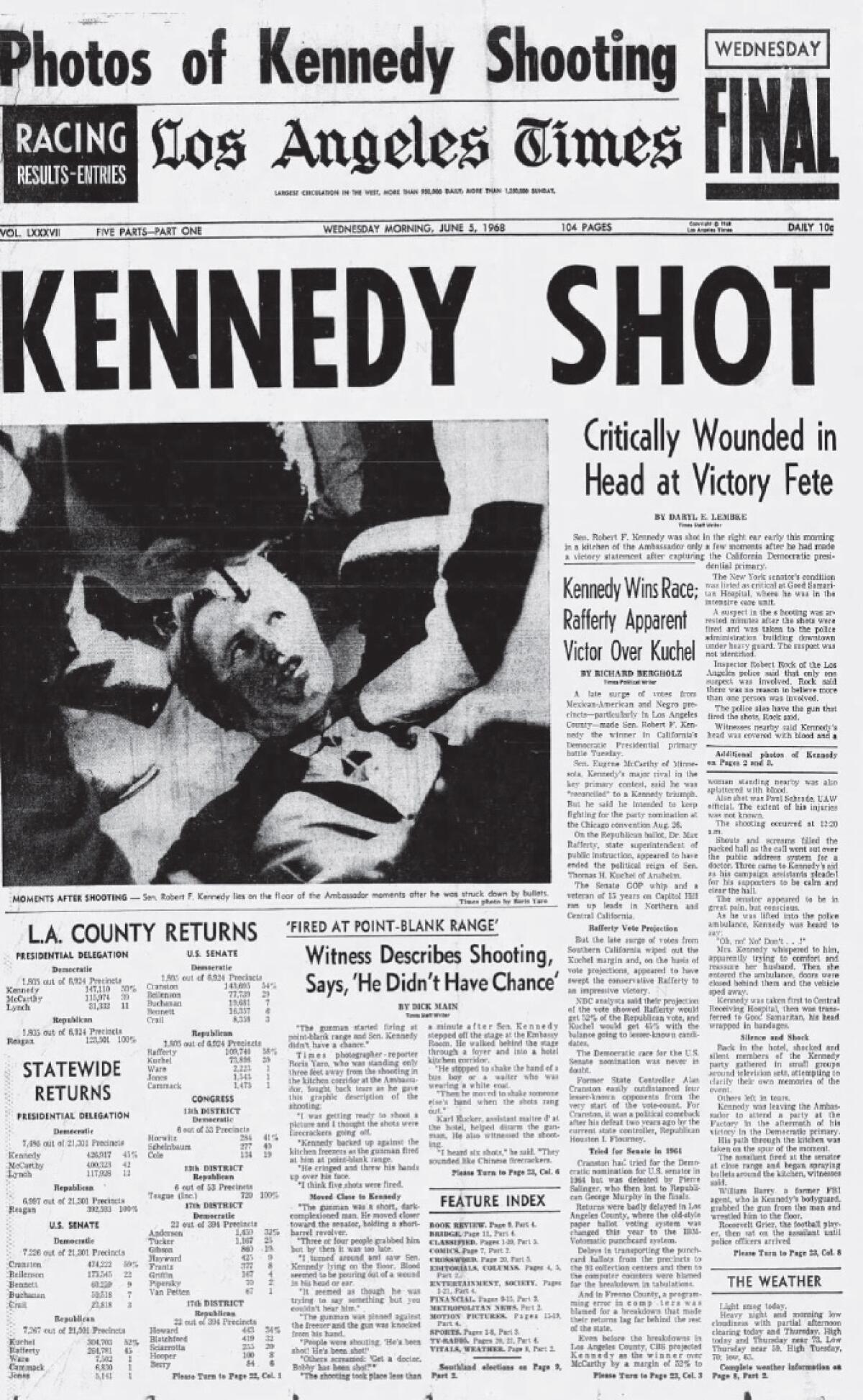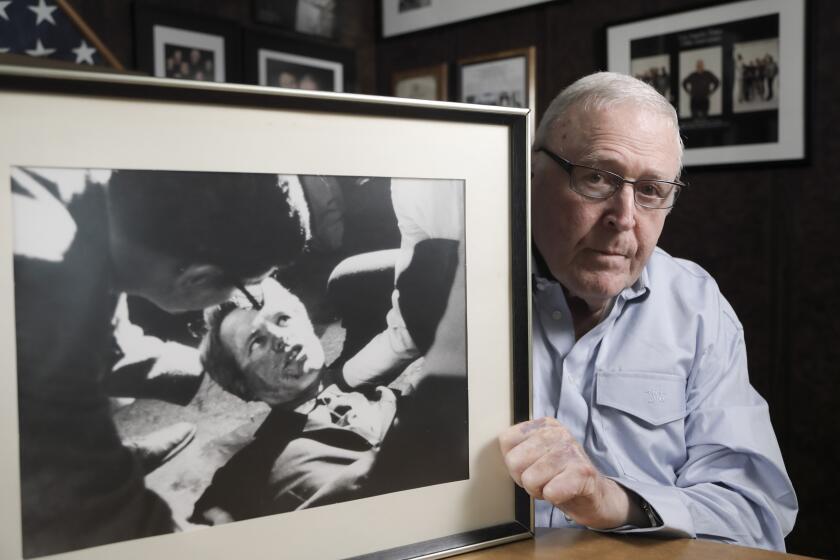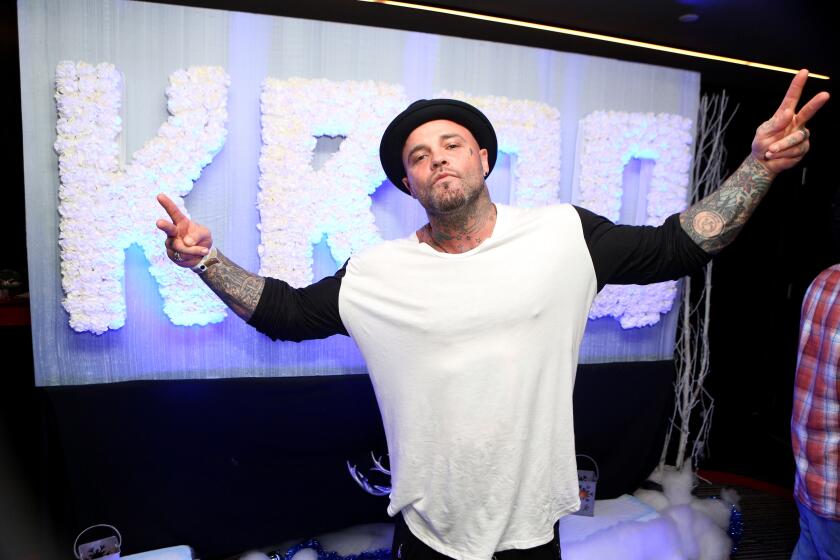L.A. Times reporter Bud Lembke, who witnessed RFK assassination, dies at 98
As a radio operator during World War II, Daryl E. “Bud” Lembke kept a diary.
“I shall live to be the ripe old age of 98 or so, that would be much nicer than being wiped out at 22,” read one of his entries — which turned out to be prophetic. The journalist’s vivid diaries would go on to form the basis of an engrossing book about his wartime experience: “Ups and Downs in a Flying Fortress: Were those trips necessary?”
Lembke, who went on to a career as a Los Angeles Times reporter, died from complications of Alzheimer’s disease on June 17, one month after his 98th birthday, in Walnut Creek.
A native of Minnesota, Lembke grew up on a farm and was raised by his grandparents. He attended Macalester College in St. Paul before joining the Army. After the war, Lembke completed his degree at the University of Minnesota and moved to Southern California to pursue journalism. He began working at a small weekly newspaper before eventually making his way to the Los Angeles Times, where he worked for 21 years.
After several years in Los Angeles, Lembke headed north, first to Sacramento to cover politics and then to San Francisco. It was at The Times that Lembke met his wife, Mary Theisen, an editorial secretary based in the Los Angeles offices.
“I would talk with Bud on the phone from the San Francisco bureau and we became friendly,” Mary said. Eventually Lembke made a visit to the L.A. office and asked her out. “It was the beginning of a wonderful romance,” Mary said.
Lembke, who primarily covered the Bay Area, was a reporter during one of the most tumultuous periods of America’s history.
“Bud was at the Ambassador hotel [in Los Angeles] the night Bobby Kennedy was killed,” Mary said. “He was on the phone to the office telling them what was going on, and it was the first time he seriously said, ‘Stop the presses!’” As events unfolded that fateful night, Lembke’s reporting changed from a story about Kennedy’s victory in California’s presidential primary to one about devastating loss.
The following day, Lembke’s byline appeared beneath the headline, “KENNEDY SHOT.”

Despite the harrowing events of that night, Lembke was able to remain levelheaded, according to his wife. “He was a true newsman, he wanted to tell people what was happening clearly and objectively,” Mary said.
Lembke retired from The Times in the 1980s, but had no intention of slowing down. He had an entrepreneurial spirit and founded his own newspaper, the Dana Point Beacon, in Orange County.
“I call it an artistic success,” laughed Mary. “The paper wasn’t sustainable,” and they sold it. But Mary always had faith in her husband’s ingenuity. “He would build things from nothing,” she said, “I always trusted him because he did everything with his whole heart.”
Lembke then moved into politics and served as press secretary to California state Sen. David Roberti (D-Los Angeles). But he made his way back to writing and published a newsletter on local government called Political Pulse for many years.
In 2005, the Lembkes moved to the Rossmoor retirement community in Walnut Creek, where a new phase in the wordsmith’s life began — as a playwright.
“Bud loved playwriting because it was like a jigsaw puzzle,” said Mary. “He liked deciding where the exits and entrances would go, and what all the variables were.”
Yaro tutored the actor who played Animal, the rumpled photographer on “Lou Grant”
Playwriting was a welcome change from his years reporting on breaking news. “It was an opportunity for Bud to create his own reality,” said longtime friend Alan Cunningham. “He would get lost in scenarios he had dreamed up.”
Lembke’s good friend at Rossmoor, Duke Robinson, shared his love of theater and plays.
“A few years ago I turned to him and said, ‘Bud, why don’t we have a drama association here?’ Robinson recalled. “Bud said, ‘I was thinking the exact same thing! That’s exactly what we need!’” Six months later, the Drama Assn. of Rossmoor was born.
Lembke’s play, “Arthritis Be Damned,” inspired by his time in the retirement community, was a smash hit. “Bud had a very wry sense of humor,” Robinson said. “He understood the complexities and ironies of life.”
“He was a true observer,” Mary said, “and saw the humor in things — most of all, Bud really loved people,” and he put it all into words.
Lembke is survived by his wife, daughter Nancy Brenn and a grandson, Jon Lovett.
More to Read
Start your day right
Sign up for Essential California for the L.A. Times biggest news, features and recommendations in your inbox six days a week.
You may occasionally receive promotional content from the Los Angeles Times.








